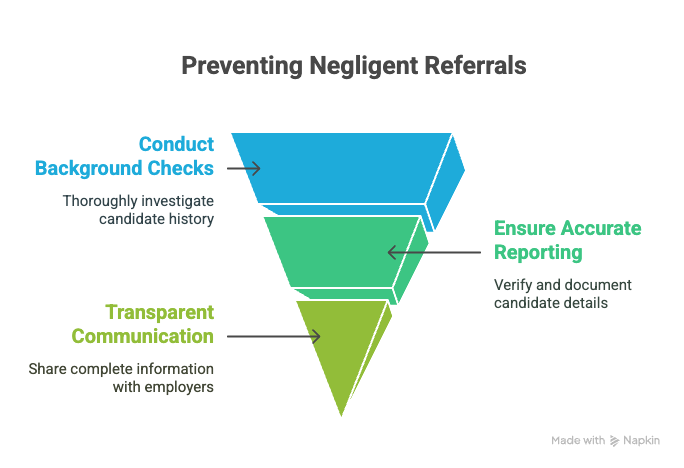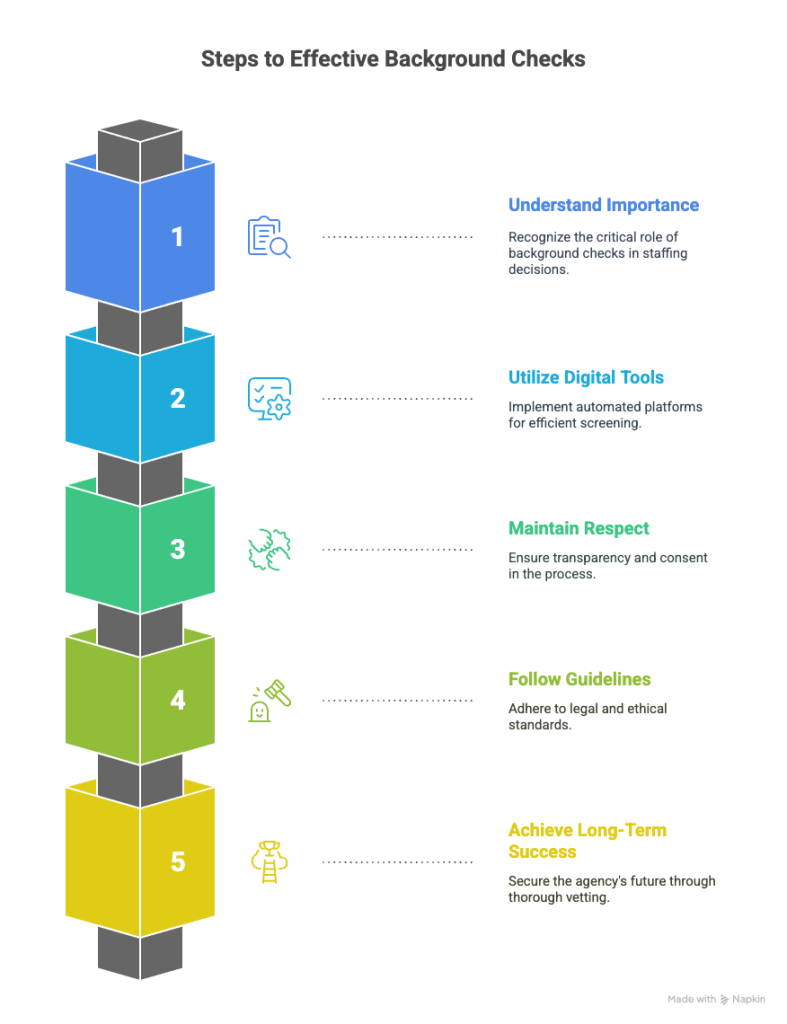When it comes to staffing, hiring the right people is absolutely crucial. A key component of this process is thorough screening. But what happens when you skip this step? The risks are far-reaching and can impact workplace safety, legal compliance, and even the reputation of your staffing agency. This guide will drill down into the potential pitfalls of placing unscreened candidates and provide insight into maintaining rigorous hiring processes.
Key Takeaways
- Candidate screening is essential because nearly half of new hires fail within the first 18 months, highlighting the risks of hiring without due diligence.
- Legal issues like negligent referrals can lead to lawsuits if an agency provides misleading candidate information to employers.
- Comprehensive background checks are critical in ensuring workplace safety, with unchecked candidates potentially increasing accident risks.
- FCRA non-compliance can result in severe financial penalties for agencies, emphasizing the need for adherence to federal guidelines when conducting background checks.
- The reputation of a staffing agency hinges on diligent screening practices, as unscreened hires can damage client trust and lead to contract losses.
Introduction
Uncovering the true cost of negligence in hiring starts with an eye-opening revelation: 46% of new hires fail within the first 18 months, as reported by a Leadership IQ study. This statistic underscores why candidate screening isn't just a formality. It's a pillar for sustainable staffing decisions. Foregoing this crucial step is not only a gamble with your company’s resources but also an invitation to a host of issues, from legal liabilities to loss of client trust.
In today's hiring environment, the risks associated with placing unscreened candidates span across multiple areas. Inadequate screening can lead to potential legal challenges, financial losses, and a tarnished reputation for staffing agencies. This guide will delve into these consequences, emphasizing the importance of diligent candidate screening.
EXPERT INSIGHT: From my experience in staffing, I learned early on not to skip over the screening process. Every placement involves entrusting a business in reliance upon delivering not only talent but safety, compliance, and integrity. A false step can lose a company a lawsuit, an injury, or a crucial client relationship. I've seen how careful screening is not only essential for protecting the workplace but for retaining the confidence we work so hard to earn. There is perhaps only one-rule I regard with utmost importance in every hiring decision: thoroughness at the beginning averts disruption later on. - Charm Paz, CHRP
Understanding Staffing Negligent Referral
Negligent referral occurs when an employer or staffing agency provides misleading or insufficient information about a former employee to a prospective employer, resulting in harm. For staffing agencies, this risk is magnified because they act as intermediaries, connecting candidates with businesses that entrust them to provide reliable workers.

Legal liability is significant in such cases. Negligent referrals can lead to lawsuits if the new employer incurs damage from relying on inaccurate information. This is where adherence to legal standards, like those outlined in the EEOC’s guidance, becomes crucial. The guidelines emphasize the necessity of conducting thorough and accurate background checks, ensuring that any information shared is both truthful and comprehensive.
Consider a real-world scenario where an agency forwards a candidate with a history of workplace violence to a client without disclosing this detail. If an incident occurs, the client may hold the agency accountable for not providing full disclosure. Situations like this highlight the necessity of maintaining integrity and diligence during the recruitment process.
Understanding and applying principles from resources such as the FCRA can further protect staffing agencies. The FCRA outlines employer responsibilities in accurate and fair reporting, setting a framework that, when followed, helps prevent negligent referrals. Financial and reputational damages from non-compliance can be steep, underscoring the importance of embedding these standards into agency protocols.
Ultimately, diligent screening and transparent communication are essential. Ensuring the candidates you recommend are accurately portrayed not only shields your agency from potential legal issues but also fortifies your reputation as a trustworthy partner in the staffing industry.
Workplace Safety and Staffing
Placing unscreened candidates into a workplace can pose significant safety risks. This issue is especially critical in industries such as construction, manufacturing, and healthcare, where safety standards are paramount. Imagine a construction site where a candidate with undisclosed substance abuse issues is operating heavy machinery. The risk to other workers and the candidate themselves is substantial. Similarly, in healthcare, an unchecked background could lead to hiring someone who doesn't have the requisite qualifications, endangering patient care.
Statistics underscore the importance of rigorous screening. According to a study by SHRM, workplaces that implement thorough background checks report 29% fewer workplace accidents. A separate report from the National Safety Council highlights that inadequate screening can increase the likelihood of workplace injuries by as much as 25%.
To mitigate these risks, integrate safety-focused questions early in the hiring process. Ask candidates about their compliance with safety protocols in previous roles. Verify certifications and licenses carefully. Use technology to assist in verifying past employment and qualifications efficiently. Develop a checklist that ensures each candidate meets your safety criteria before being placed, reducing the potential for accidents and ensuring a safe working environment for all. Regularly update your screening processes to align with current industry standards and practices.
Legal Ramifications: FCRA Penalties
The Fair Credit Reporting Act (FCRA) is a federal law that governs how consumer information is collected and used, particularly by employers during background checks. For staffing agencies, understanding the FCRA is crucial. Non-compliance can lead to severe penalties that impact both finances and operations.
Not adhering to the FCRA can result in lawsuits, fines, and damage to your business reputation. Agencies may face statutory damages ranging from $100 to $1,000 per violation, court costs, and attorney fees. Take the case of a staffing agency that failed to obtain candidate consent before a background check, resulting in a costly class-action lawsuit. Such penalties aren't hypothetical—they're a reality for many businesses.
To steer clear of these pitfalls, ensure your agency obtains written permission from candidates before any background check. Clearly communicate how the information will be used. Regularly update your knowledge of FCRA requirements and consider consulting legal experts. Tap into training resources dedicated to FCRA compliance to ensure your practices are up-to-date. With the right steps, you can protect your agency from costly oversights.
Impact on Staffing Agency Reputation
Trust is your agency's currency. When you place unscreened candidates, you're gambling with it. Clients expect reliability and safety. A single misstep can break their confidence. Think of an agency losing a major contract because of a candidate's undisclosed criminal record. Reputation takes years to build but moments to damage.
Real-world examples abound. Consider ABC Staffing, a prominent agency that faced public scrutiny when an unscreened candidate caused harm at a client's workplace. The backlash was swift. They lost key clients and had to issue public apologies. Recovery was grueling and costly.
How do you mend credibility? Start by acknowledging the mistake, then enhance your processes. Implementing stringent screening protocols is essential. Educate your team on the importance of these measures. Communicate openly with clients about improvements. Rebuilding takes time but showing a commitment to change can restore trust and strengthen your brand.
The Importance of Comprehensive Background Checks
Thorough screening processes are not just a formality—they form the backbone of smart staffing decisions. Comprehensive background checks give you a clearer picture of a candidate's past, helping you make informed hiring choices. By catching red flags early, you can avoid future complications that may arise from poorly vetted hires.
In today's digital age, there are numerous tools that streamline and enhance the screening process. Platforms like Checkr and GoodHire offer automated services that make background checks faster and more efficient. These tools can dive into criminal records, verify employment history, and even check credit scores, depending on your needs. They help ensure that no stone is left unturned.
When conducting background checks, maintaining respect and confidentiality is crucial. Be transparent with candidates about the process and get their consent. Explain what you are checking and why it matters. This approach not only respects their privacy but also builds trust from the outset.
Stick to established guidelines and best practices to ensure your checks are both effective and compliant. For instance, always follow the Fair Credit Reporting Act guidelines and make sure you provide candidates with a copy of the results and their rights under the law. Use resources like government websites or industry blogs to stay updated on any changes in regulations that may affect your screening process.

By prioritizing a detailed and respectful background check process, you're not just protecting your staffing agency—you’re also laying the groundwork for long-term success.
Placing unscreened candidates can lead to significant risks that should not be underestimated. Throughout this guide, we've explored the various pitfalls—from legal liabilities to safety concerns, and the potential harm to your agency's reputation.
Conclusion
Every staffing decision impacts these areas, and making informed choices begins with rigorous screening. Legal issues, such as those related to negligent referrals and FCRA non-compliance, are avoidable with due diligence. In terms of safety, a thorough screening process ensures that candidates meet industry standards, especially in high-risk fields. Trust with clients is built on dependability, which relies on demonstrating consistent hiring standards.
This guide highlights the necessity of comprehensive background checks and how modern technological tools can streamline this process. By integrating these practices, you're not just protecting your agency but also fortifying it against avoidable setbacks.
Now is the time to make candidate screening a cornerstone of your staffing strategy. Invest in the processes and technologies that safeguard your operations and maintain the integrity of your brand.
Frequently Asked Questions (FAQs)
Within candidate assessment, staffing practitioners are commonly asking multiple questions in an effort to refine their practices. This section addresses a number of common issues, including both what is legally implied and practical strategies, thus allowing for better-informed and safe hiring decisions. We will outline key information you should know.
Can staffing agencies be sued for not screening candidates?
Yes, they can be held liable. If harm results from not properly screening candidates, affected parties might file lawsuits. Ensuring thorough screenings can help you avoid legal troubles.
What percentage of candidates lie on resumes?
Over half of candidates admit to lying on their resumes. Details like job experience and skills are often exaggerated.
How do unscreened hires affect workplace safety?
Unscreened hires can increase risks of accidents and unsafe practices. A single careless mistake can lead to workplace injuries or property damage.
What are the penalties for FCRA violations in staffing?
Penalties can include fines and legal fees. Violations of the Fair Credit Reporting Act can also damage your agency's reputation and trust.
How can staffing agencies reduce screening costs?
Use technology for automated screenings and partner with third-party vendors. Implementing these steps can lower costs and streamline the process.
What are the benefits of thorough candidate screening?
Thorough screenings lead to better job matches. They also reduce turnover rates and foster a more productive work environment.
How long does the screening process usually take?
It generally takes a few days to a week. The duration may vary based on the level of detail required for the position.
What common background checks should staffing agencies perform?
Conduct criminal history, employment verification, and education checks. Tailor checks to the job's requirements for optimal results.
What tools do staffing agencies use for candidate screening?
Agencies use software for resume parsing, background checks, and skills assessments. These tools improve efficiency and consistency.
How does proper screening impact client relationships?
It builds trust and ensures client satisfaction. Delivering quality candidates enhances your agency's reputation and client retention.
Definitions
Candidate Screening
Candidate screening is the process of reviewing a job applicant’s background, skills, and qualifications before hiring. It includes checking resumes, verifying employment history, confirming certifications, and running background checks. Doing it well helps you spot potential risks early and make choices that protect your brand and clients. For example, verifying a nurse’s license before placement ensures compliance and patient safety.
Negligent Referral
A negligent referral happens when a former employer or staffing agency shares misleading or incomplete information about a candidate, leading to harm in their new role. If you omit important facts—like a candidate’s history of misconduct—you could be liable if that person causes damage later. Accuracy and honesty in referrals protect both you and your clients from potential lawsuits.
Background Check
A background check examines a candidate’s history to confirm details like criminal records, employment, education, and licenses. Staffing agencies run these checks to ensure candidates are fit and safe to place. For instance, using services like Checkr or GoodHire can help you quickly detect if a candidate has had run-ins with the law or faked their job history.
Workplace Safety
Workplace safety refers to the steps taken to ensure a hazard-free environment for all employees. When staffing roles, especially in high-risk industries like construction or healthcare, placing unqualified or unvetted candidates can lead to accidents. Screening for certifications, asking safety-related questions, and checking prior incidents can prevent injuries and build trust with clients.
FCRA Compliance
FCRA compliance means following the Fair Credit Reporting Act when using background checks for hiring. You must get written permission from the candidate, explain how the data will be used, and share results if action is taken. Failing to comply can cost you in fines and lawsuits. Setting up a clear, documented process for consent and communication helps keep your agency on the right side of the law.
References
- Leadership IQ study: https://www.leadershipiq.com/blogs/leadershipiq/research
- Leadership IQ soft skills study: https://www.revenstrat.com/post/leadership-iq-study-the-89-failure-rate-due-to-soft-skills-deficits

GCheck Editorial Team
Meet the GCheck Editorial Team, your trusted source for insightful and up-to-date information in the world of employment background checks. Committed to delivering the latest trends, best practices, and industry insights, our team is dedicated to keeping you informed.
With a passion for ensuring accuracy, compliance, and efficiency in background screening, we are your go-to experts in the field. Stay tuned for our comprehensive articles, guides, and analysis, designed to empower businesses and individuals with the knowledge they need to make informed decisions.
At GCheck, we're here to guide you through the complexities of background checks, every step of the way.






